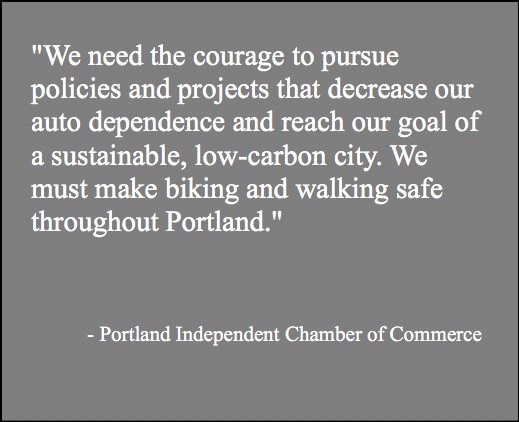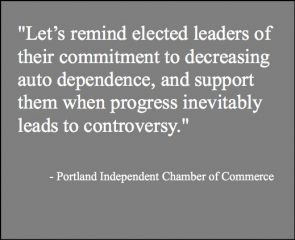The Portland Independent Chamber of Commerce (PICOC) has turned their influential attention to an issue near and dear to our hearts: the struggle for safer streets.
Launched early this year by a relatively young cadre of tech industry leaders as an antidote to the Portland Business Alliance, PICOC wants more Portland businesses to step up and support “the Vision Zero movement.”
Their latest campaign hit inboxes and social media feeds today. It’s timed to influence City Council’s upcoming vote on the Vision Zero Action Plan released by the Portland Bureau of Transportation earlier this month. Council is slated to formally adopt the plan on October 12th.
Here’s the full text of the message they want businesses to sign onto:
There’s a disturbing trend in Portland. Over the past 25 years the city has steadily been lowering traffic deaths, but the past two years this progress has reversed. In 2015, 37 people died, the highest count for the past 12 years. This year has been even more grim: as of September 18th, 32 people have died [note: the actual number is 35], including 9 [10] pedestrians and four cyclists. If the current trend holds traffic deaths will be back at 1990’s levels.
These traffic deaths represent an equity crisis. They disproportionately occur in neighborhoods with larger minority and low-income populations. Residents of low-income neighborhoods in Multnomah County are 2.3 times more likely to be killed walking. Oregonians aged 65 or older are four times more likely to be killed while walking. We are failing to protect our most vulnerable citizens, and in doing so we are failing to uphold our values as Portlanders.
Portland has long had a reputation for being a walkable, bikeable city with great public transportation. However, this reputation is only deserved by our close-in neighborhoods. These inner neighborhoods have seen marked increases in rents and home prices. Portland’s remaining affordable neighborhoods lack basic amenities like sidewalks, bike lanes and frequent bus service. Without safe alternatives, residents of these outer neighborhoods are being pushed into auto dependence.
Advertisement
Portland has a vision to fix this. Last year, our City Council formally adopted an audacious goal to eliminate all traffic deaths and serious injuries. This policy, called Vision Zero, states that all traffic deaths are preventable, and that no traffic deaths are acceptable. The idea started in Sweden and has spread around the world. Vision Zero has been endorsed by Portland’s current and incoming mayors, our transportation commission and the head of the Bureau of Transportation.
Despite official support achieving Vision Zero will be difficult. We need the courage to pursue policies and projects that decrease our auto dependence and reach our goal of a sustainable, low-carbon city. We must make biking and walking safe throughout Portland. We must continue to aggressively invest in our transit infrastructure. We must move towards a downtown where few ever feel the need to drive.
Portland has a reputation for being a city that is affordable, sustainable, and equitable. If we fail to eliminate traffic deaths, we fail to uphold these values. Failing would mean more high-traffic roads, fewer walkable neighborhoods, and no affordable neighborhoods where biking is safe and family-friendly. It would mean a Portland that is increasingly divided.
PICOC encourages all Portland businesses to join us in supporting the Vision Zero movement. Let’s remember why we started our businesses here, why we can attract top talent to live here, and how our businesses benefit from the halo of Portland’s reputation as a great American city. Let’s remind elected leaders of their commitment to decreasing auto dependence, and support them when progress inevitably leads to controversy.
Our City Council votes on October 12th on whether to adopt an action plan to pursue Vision Zero. We are calling on members of the business community to sign this testimony urging City Council to adopt the Vision Zero action plan.
The testimony is signed by local investor Alex Payne, an early employee of Twitter and co-founder of Simple, an online bank; Glenn Fee, Vice President of Gateway to College; Lennon Day-Reynolds, an investor and tavern owner; Mara Zepeda, CEO of Switchboard; Marcus Estes, CEO of Chroma; and William Henderson, CEO of Knock Software. (You might recall Henderson from our profile of his bike-related projects last year. Henderson is also a new member of the PBOT Bureau and Budget Advisory Committee.)
This is PICOC’s first foray into transportation advocacy. They’ve previously helped raise awareness and funding for a variety of causes including black entrepreneurs, a nonprofit community publishing organization, a nonprofit newspaper, open city government data, and more.
— Jonathan Maus, (503) 706-8804 – jonathan@bikeportland.org
BikePortland is supported by the community (that means you!). Please become a subscriber or make a donation today.



